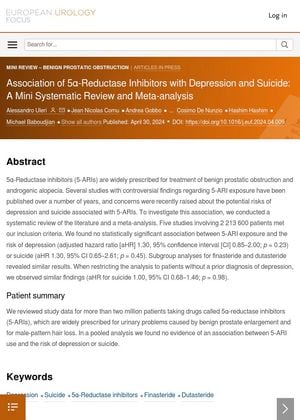Association of 5α-Reductase Inhibitors With Depression and Suicide: A Mini Systematic Review and Meta-Analysis
May 2024
in “
European urology focus
”

TLDR Drugs for prostate enlargement and hair loss were not linked to increased risk of depression or suicide.
A systematic review and meta-analysis of five studies involving 2,213,600 patients was conducted to investigate the potential risks of depression and suicide associated with 5α-Reductase inhibitors (5-ARIs), drugs commonly prescribed for benign prostatic obstruction and androgenic alopecia. The analysis found no statistically significant association between 5-ARI exposure and the risk of depression (adjusted hazard ratio [aHR] 1.30, 95% confidence interval [CI] 0.85–2.00; p = 0.23) or suicide (aHR 1.30, 95% CI 0.65–2.61; p = 0.45). Similar results were observed in subgroup analyses for finasteride and dutasteride, and when the analysis was restricted to patients without a prior diagnosis of depression.





